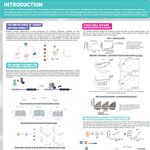Scalable Manufacturing and Nanovesicle Delivery of CRISPR-Cas9 Ribonucleoproteins Using a cGMP- Compliant Cell Engineering Platform
DATE: September 17, 2020
TIME: 8:00am PT
CRISPR-Cas9 has tremendous potential as a therapeutic tool for treating human diseases. However, prolonged expression of the nuclease and gRNA from viral vectors in an in vivo context may cause unwanted off-target activity and immunogenicity. To overcome these safety issues, a system was recently developed for transient delivery of CRISPR-Cas9 ribonucleoprotein (RNP), recruiting Cas9 protein by chemically-induced dimerization and sgRNA via a viral RNA packaging signal into extracellular nanovesicles. This system, termed NanoMEDIC (nanomembrane-derived extracellular vesicles for the delivery of macromolecular cargo), demonstrates efficient genome editing in various hard-to-transfect cell types, including human induced pluripotent stem (iPS) cells and myoblasts, and also in vivo in a luciferase reporter mouse model. To demonstrate the feasibility of industrial scale manufacturing, a xeno-free suspension culture system to produce NanoMEDIC by flow electroporation was developed using chemically defined media. We show that electroporation parameters using a cGMP-compliant cell engineering platform could be optimized to increase NanoMEDIC production in HEK293 cells, and the process is scalable for flow electroporation of over one billion cells. These findings indicate that NanoMEDIC manufacturing may be amenable for large scale production.
Learning objectives:
-
Identify considerations for switching from an adherent cell lipofection method to suspension cell electroporation
-
Assess experimental parameters that can be optimized for efficient electroporation of HEK293 cells
-
Demonstrate scalable extracellular nanoparticle production by electroporation
Webinars will be available for unlimited on-demand viewing after live event
LabRoots is approved as a provider of continuing education programs in the clinical laboratory sciences by the ASCLS P.A.C.E. ® Program. By attending this webinar, you can earn 1 Continuing Education credit once you have viewed the webinar in its entirety.






